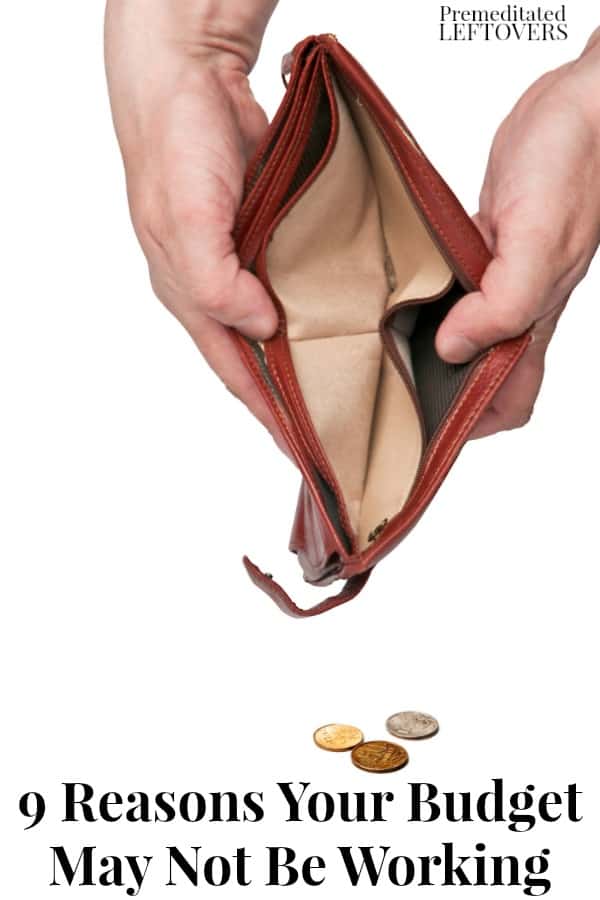Use this list of reasons your budget may not be working to identify trouble spots and correct them.

Anyone with a family knows that the best way to keep your head above water financially is to create a budget. This seems simple enough, but getting good at budgeting takes some practice to get down and you may be getting frustrated after months, or even years, of trying only to keep finding it is not working for you. Let’s look at some common reasons budgets don’t work as planned.
9 Reasons Your Budget May Not Be Working
1. You may not be estimating your expenses correctly.
One way to mess up a budget is to not take a good honest look at where you are spending and to only estimate. You may think you are only spending $300 a month on food, but if you are not counting trips to eat out or small trips to the store to pick up something you forgot, you could very well be spending way more than that. For a month or two, try keeping very close score of every purchase you make and see how it stacks up to what you have allotted in your budget for that category.
2. You are forgetting to include things in your budget.
Have may forget to include annual or semi-annual expenses like property taxes or life insurance Did you forget to budget for birthdays? Did you include room for new tires, doctor co-pays, and other unexpected expenses? Review your expenses from last year to get an idea of how much you need to set aside for these expenses. Here are some things you may be forgetting to add to your budget.
3. Your budget may not be realistically meeting your needs.
You may have too little or too much allotted for something. Track your spending habits to see where you could be making a mistake. Here are 10 Tips for Staying on a Budget.
4. It may be too complicated.
If your budget is too hard to stick with or has too many little things in it, you may be having a hard time staying the course. Try to simplify it so it is easier to work with. Here is a simple budget planner and bill reminder to help keep you on track.
5. You may have too many people trying to use it.
A good rule of thumb is to have one central person who handles the budget in your home. This way, you have an assigned individual who oversees everything and nothing is spent outside the budget without being reported. Consider checking your joint bank account each day to see if either of you have forgotten to share an expense.
6. You spend more than you make.
Living outside your means is one sure-fire way to destroy a budget. Look at ways you can cut expenses in order to stay within your finances. It could be simple ways such as cutting your unneeded cell phone extras or taking a sack lunch to work. Here are tips to help you stop living paycheck to paycheck.
7. You are not saving anything.
Part of budgeting is saving some of it and not spending it all each month. A budget is only doing part of its job if you are still living paycheck to paycheck. Make sure you set aside money for an emergency or a “rainy day” so if you do accidentally go over budget at some point, you have a way to recover without completely blowing it. Here are tips for setting up an emergency fund on a tight budget.
8. You are not communicating with others about your budget.
It is important that the members of the household (especially your spouse or partner) know you are setting up a budget. This way, you can figure out together where money needs to be spent and no one is going behind and sabotaging the other’s efforts. Consider keeping an expense log taped to the refrigerator and have both parties write down their expenses each evening when they get home.
9. You have no rewards in your budget.
Budgeting is hard enough in itself, but it can be even more difficult if you feel like you never get to purchase anything fun. It is important that you not only save and spend on expenses, but set aside money for entertainment. If you don’t, you will feel like you do it all for nothing and you will find yourself cutting into other portions of your budget to attain some.
More Money Saving Tips
How to Stop Living Paycheck to Paycheck

Wiser Adviser says
It helps if you divide your expenses into non-discretionary (mortgage, health insurance premiums, taxes, etc.) and discretionary (eating out, subscriptions, etc.). You might be able to find savings in both categories (e.g. Refinance mortgage or change deductibles or utility companies), but if you are finding you don’t have any ability to save 3 months of expenses as an emergency fund (6 months for a couple), and additional savings for your first home, retirement planning, and children’s future education needs, you need to focus on cutting discretionary spending and increasing your income, perhaps by creating additional streams of income. Ask yourself: What can I do, or what do I know that someone is willing to pay for? Maybe look around your home and sell things you no longer use. Also be smarter about when and how you buy things. Buy lightly used cars instead of new. Wait for sales or when dealer incentives are being advertised. Buy last year’s leftover models instead of current. Use groupon and other shopping bots to save money on things you need. Sign up for reward programs like Plenti to get gas and savings on other merchandise. Use no annual fee credit cards with cash back on gas and groceries. Use Health Savings Accounts and Employer or individual deductible retirement accounts to reduce your taxes, then put this savings where you won’t be tempted to spend it.